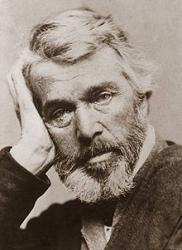Go Ad-Free
If you regularly use Hymnary.org, you might benefit from eliminating ads. Consider buying a Hymnary Pro subscription.

| Short Name: | Thomas Carlyle |
| Full Name: | Carlyle, Thomas, 1795-1881 |
| Birth Year: | 1795 |
| Death Year: | 1881 |
Thomas Carlyle (4 December 1795 – 5 February 1881) was a Scottish satirical writer, essayist, historian and teacher during the Victorian era. He called economics "the dismal science", wrote articles for the Edinburgh Encyclopedia, and became a controversial social commentator.
Coming from a strict Calvinist family, Carlyle was expected to become a preacher by his parents, but while at the University of Edinburgh he lost his Christian faith. Calvinist values, however, remained with him throughout his life. His combination of a religious temperament with loss of faith in traditional Christianity, made Carlyle's work appealing to many Victorians who were grappling with scientific and political changes that threatened the traditional social order. He brought a trenchant style to his social and political criticism and a complex literary style to works such as The French Revolution: A History (1837). Dickens used Carlyle's work as a primary source for the events of the French Revolution in his novel A Tale of Two Cities.
--en.wikipedia.org
========================
Carlyle, Thomas, the Essayist and Historian, is known to hymnody solely through his translation of Luther's "Ein feste Burg," q.v. He was born near Ecclefechan, Dumfriesshire, Dec. 4, 1795, and died at Chelsea, Feb. 5, 1881.
--John Julian, Dictionary of Hymnology (1907)
| Texts by Thomas Carlyle (4) | As | Authority Languages | Instances |
|---|---|---|---|
| A safe stronghold our God is still | Thomas Carlyle (Translator) | English | 54 |
| Ein feste Burg ist unser Gott | Thomas Carlyle, 1795-1881 (Translator (English)) | German | 1 |
| So here hath been dawning | Thomas Carlyle (Author) | English | 12 |
| The future hides in it | Thomas Carlyle (Author) | 2 |